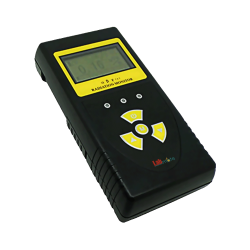
Dosimeter LMDOM-B100 is a compact, portable surface contamination monitor designed to detect and quantify α, β, and γ radiation and is suitable for use in temperature ranges between 40°C to 50°C. Additionally, it can measure radiation dose rates within the range of 0.01 to 10,000 u Sv/h and features a programmable system with four alarm modes. It utilizes a pancake GM tube detector with detection capabilities for Sr-90 and Am-241 which offers precision and reliability, ensuring accurate radiation measurements in various settings.
Get Quote| Temperature Range | 40 °C to 50°C |
| Counting Rate | 0 to 500000 CPM, 0 to 8000 CPS |
| Radiation Dose Rate | 0.01 to 10000 u Sv/h |
| Energy Ranges | 25 KeV to 7 MeV |
| Display Unit | CPM, CPS, Bq/cm², μ Gy/h, μ Sv/h |
| Detector | Pancake GM tube Φ: 45 mm |
| Detection Efficiency |
Sr - 90(546 KeV, 2.3 MeV βmax) about 75% Am - 241(5.5MeV α) about 36% |
| Sensitivity | 3500 CPM/ mR /h (according to Cs-137) |
| Humidity | ≤ 85% RH |
| Power | Two AA size battery |
| Internal Dimension | 160 × 85 × 38 mm |
| External Dimension | 260 × 206 × 126 mm |
| Net Weight | 0.5 kg |
| Gross Weight | 0.9 kg |
 Equipped with a waterproof carrying case to protect and carry the unit safely
Equipped with a waterproof carrying case to protect and carry the unit safely
 Enhanced with crystal-clear visuals with high-definition LED backlight display, ensuring easy reading and interpretation of critical information
Enhanced with crystal-clear visuals with high-definition LED backlight display, ensuring easy reading and interpretation of critical information
 Powered by two AA-size batteries, our dosimeter delivers extended operational hours while remaining conveniently portable
Powered by two AA-size batteries, our dosimeter delivers extended operational hours while remaining conveniently portable
 Provided with versatile 4-alarm programming system which alerts via audio and shake alarms when radiation levels exceed preset thresholds
Provided with versatile 4-alarm programming system which alerts via audio and shake alarms when radiation levels exceed preset thresholds
 It accumulates radiation dose over time, allowing users to track their cumulative exposure
It accumulates radiation dose over time, allowing users to track their cumulative exposure
It finds application in various settings for detecting alpha, beta, and gamma radiations including nuclear power stations, environmental protection agencies, and similar environments.
Get Quote for
Dosimeter LMDOM-B100
Related Products